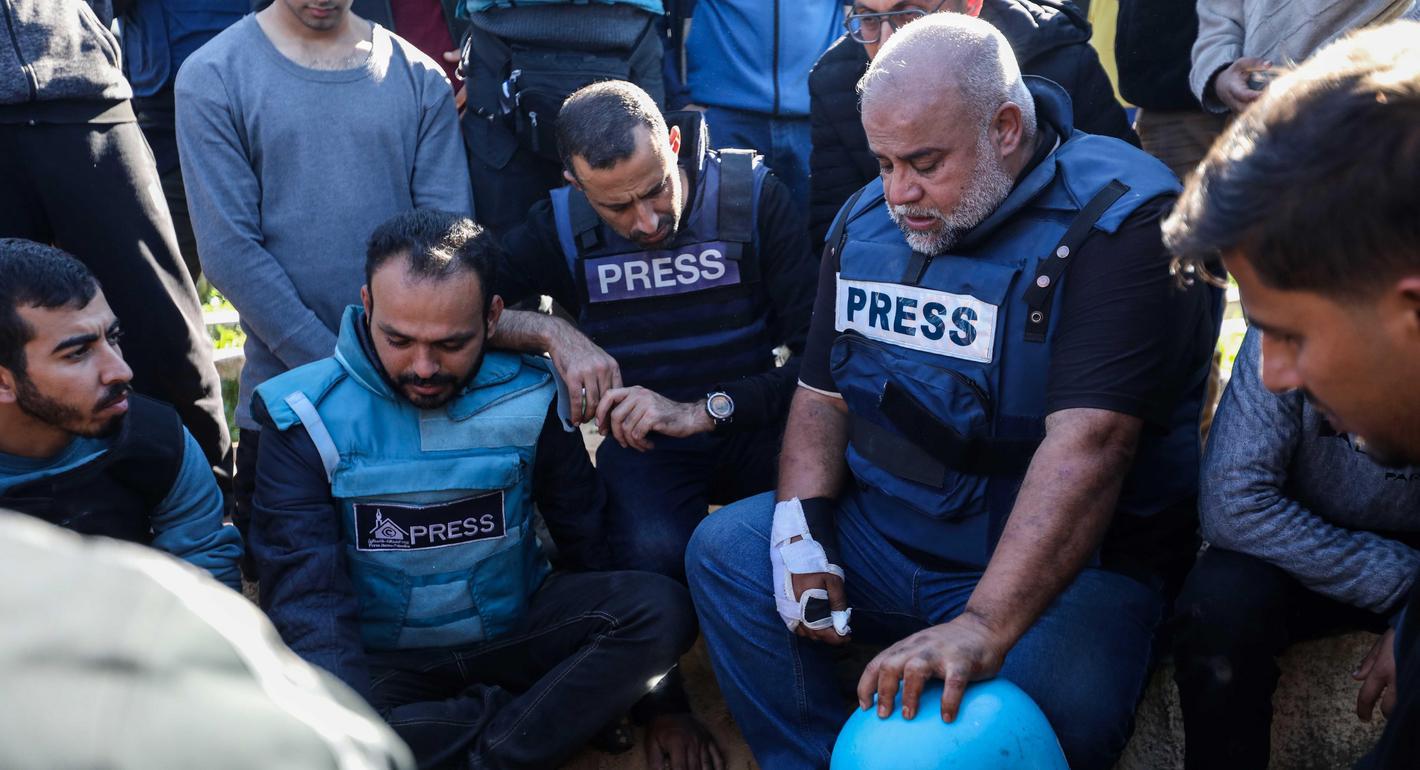Six months into the conflict, Hamas continues to challenge the Israeli army—raising questions about Israel’s ability to eradicate the group.
Reham Owda
{
"authors": [
"Hamdullah Baycar"
],
"type": "commentary",
"blog": "Sada",
"centerAffiliationAll": "dc",
"centers": [
"Carnegie Endowment for International Peace"
],
"collections": [
"The Gaza War and Regional Reverberations"
],
"englishNewsletterAll": "menaTransitions",
"nonEnglishNewsletterAll": "",
"primaryCenter": "Carnegie Endowment for International Peace",
"programAffiliation": "MEP",
"programs": [
"Middle East"
],
"projects": [],
"regions": [],
"topics": []
}
Source: Getty
The Qatari state-owned media network has long been subject to American and Israeli attacks for its unfavorable coverage.
Since the beginning of the war on Gaza, support among Western nations for Israel’s military assault has been nearly limitless. Just as shocking has been the neglect of their own supposedly sacred values, when leaders believe that they do not advance their own interests. The United States, in particular, has discarded not only the sanctity of international law, but also freedom of the press: during his visit to Doha on October 13, U.S. Secretary of State Antony Blinken reportedly asked Qatari Prime Minister Sheikh Mohammed bin Abdulrahman al-Thani to “turn down the volume” of Al Jazeera’s Gaza coverage.
This blatant U.S. request for censorship is not an individual case when it comes to Al Jazeera and their coverage of the Middle East and wider Muslim world. Following the U.S. invasion of Iraq in 2003, the administration of former President George W. Bush allegedly pressured Qatar to “close down, privatize, or censor” the channel. Bush’s Secretary of State Colin Powell lodged an official complaint about Al Jazeera’s war coverage with Qatar’s foreign minister, Hamad bin Jassim. Similarly, Deputy Defense Secretary Paul Wolfowitz sparked controversy when he accused Al Jazeera in July 2003 of biased news coverage that incited violence against American troops. The channel’s Baghdad bureau chief responded to Wolfowitz by noting that they had “been subject to strafing by gunfire, death threats, confiscation of news material, and multiple detentions and arrests, all carried out by US soldiers.”
Even before the Iraqi invasion, Al Jazeera was exposed to U.S. military violence at the beginning of the war in Afghanistan. The Bush administration launched a missile attack on the channel’s office in Kabul in November 2001, which the Pentagon initially denied. Based on an unpublished conversation between Bush and former British Prime Minister Tony Blair, Bush may have wanted to bomb Al Jazeera's headquarters in Doha and elsewhere. However, Blair convinced him not to do so, warning of the risk of a wider regional backlash.
While the Biden administration has not used military force against the channel, they have turned a blind eye to Israel’s killing of Al Jazeera journalists and their families. On October 25, Al Jazeera Correspondent Wael Al-Dahdouh lost most of his immediate family in an Israeli airstrike. Al-Dahdouh was then injured less than two months later by a drone strike in Khan Younis, which killed his colleague, cameraman Samer Abu Daqqa. After both incidents, U.S. National Security Council spokesman John Kirby denied that there was any evidence that Israel had deliberately targeted journalists. When Al-Dahdouh’s son Hamza was killed by an Israeli strike on January 7, Blinken offered his condolences but refrained from condemning the attack.
In this sense, despite the Biden administration’s Democratic Party affiliation, one sees very little difference from its predecessors in policy towards Israel-Palestine. Indeed, Bush praised Biden for his unconditional support of Israel in the aftermath of October 7.
As one of the few media outlets with an operational bureau in Gaza, Al Jazeera can provide on-the-ground reporting of the devastating effects of Israel's intense shelling. For this reason, Israel has repeatedly tried to shut down the channel’s coverage. Following the precedent set by the Bush administration, Israel bombed Al Jazeera’s offices in the al-Jalaa tower in Gaza City in May 2021. In October, Israeli Communications Minister Shlomo Karhi led a charge to close Al Jazeera through government regulations, citing threats to “national security.” However, given Israel’s reliance on Qatar as a mediator in negotiations with Hamas, these efforts were subsequently suspended.
Blinken’s attempt to suppress Al Jazeera reporting should thus be understood in this wider context. Given the channel’s widespread viewership in the Arab world, the Biden administration risks further deteriorating U.S. favorability in the Middle East and the broader global south. But perhaps worse is the damage Blinken’s request has done to the sanctity of press freedom—which other governments may use as an excuse to crack down domestically.
Hamdullah Baycar holds a PhD from the Institute of Arab and Islamic Studies at the University of Exeter. His work focuses on identity politics in the Gulf and international relations.
Carnegie does not take institutional positions on public policy issues; the views represented herein are those of the author(s) and do not necessarily reflect the views of Carnegie, its staff, or its trustees.
Six months into the conflict, Hamas continues to challenge the Israeli army—raising questions about Israel’s ability to eradicate the group.
Reham Owda
Iran’s adventurism may push Damascus to commit to Saudi-led efforts and reintegrate into the Arab fold.
Faysal Abbas Mohamad
By unconditionally supporting Israel’s war, Germany is increasingly isolating itself on the global stage.
Lena Obermaier
Saudi Arabia has long been perceived in the Arab world as a champion of the Palestinian cause, but developments over the past two decades suggest an imminent transformation.
Safa Nasser
The story of Reham, a young mother sheltering in Rafah, illustrates the impact of Israel’s war on women and families.
Shahd Safi